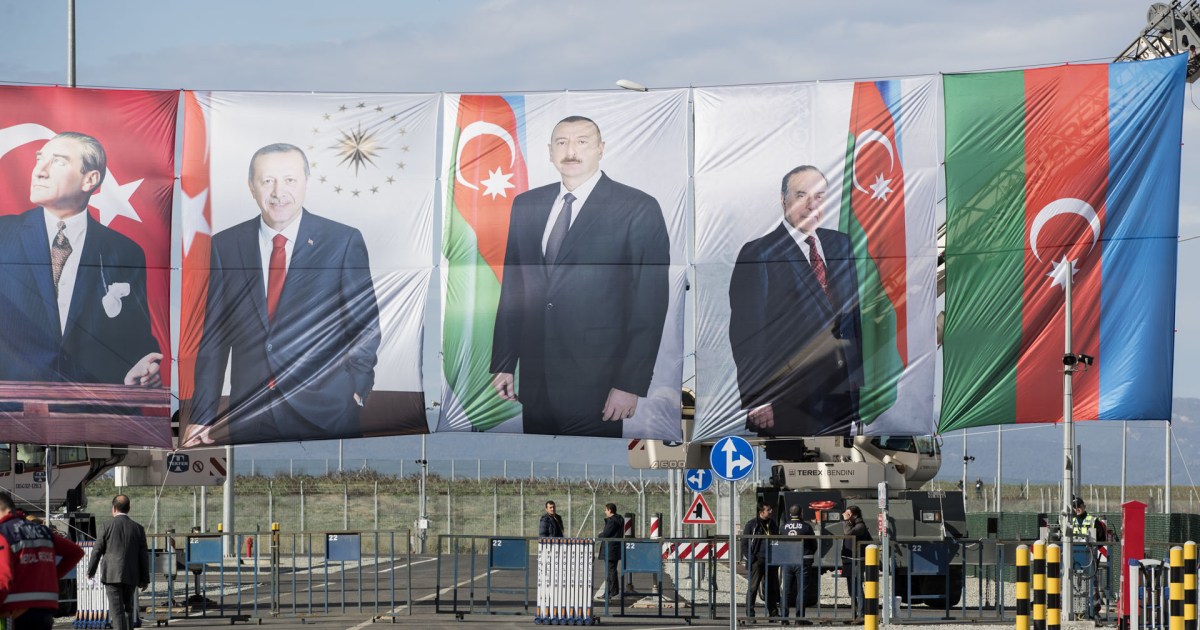The signing of the peace agreement that stopped the ongoing fighting between Armenia and Azerbaijan for several weeks was widely welcomed by the official, popular and media circles in Turkey.
Yerevan, Baku, and Russia announced two days ago an agreement to stop the war in the Nagorno-Karabakh region, which provides for the return of occupied Azerbaijani areas and the deployment of Russian peace-keeping forces, after the acceleration of the Azerbaijani forces' control of large parts of the region and their approaching its capital.
While the Turkish media reported the agreement as a victory for Azerbaijan and a success in liberating its occupied lands for decades, activists spoke of the agreement as a victory for Ankara, which they considered a basic partner in the fighting.
However, the text of the agreement to deploy only Russian forces in the region raised questions about Turkey's role in the agreement, and does the latter consider what happened to enhance the feasibility of the "rough" policy it followed?
Turkish forces to the region, the
answer to the question came from Rasul Tuson, a leader in the ruling Turkish Justice and Development Party, who confirmed to Al-Jazeera Net that the outlines of the agreement were drawn up by consensus between President Recep Tayyip Erdogan and his Russian counterpart Vladimir Putin a day before the signing of the agreement, then a meeting took place between The foreign ministers of the two countries.
Tosson confirmed to Al-Jazeera Net that Turkey will participate in peace-keeping units alongside the Russian forces, and that there will also be Turkish officers in the ceasefire monitoring center.
Former parliamentarian Tosson said that the victory of Azerbaijan is a victory for Turkey. "Our relationship with Azerbaijan is a brother-brother relationship, and we are one people in two countries."
"The agreement includes a very important point for us, which is the creation of a land corridor linking Azerbaijan with the Nakhchivan region, which means that Azerbaijan is linked with Turkey by land for the first time, which is something that some countries were trying to thwart, and this of course is a geo-strategic victory for Turkey," he added.
Communication channels
For his part, a source in the communication department of the Presidency of the Turkish Republic confirmed to Al Jazeera Net that "reaching an agreement between Armenia and Azerbaijan came after Turkish and Russian initiatives since the beginning of the recent confrontations."
"The terms of the agreement are very appropriate for Azerbaijan and Turkey, especially that it grants Azerbaijan a corridor for direct link with Turkey, and returns to it its occupied lands by Armenia," he said.
He explained that the main goal at the present time is to ensure the integrity of the lands of Azerbaijan, and Ankara will remain in contact and contact with Baku to thwart any future threat from Armenian gangs on the Azerbaijani lands, as he described it.
He pointed out that the agreement also allowed Turkey to become an influential power in the southern Caucasus, and to have a stronger opinion on energy issues, as Azerbaijan is important to Turkey on the issue of energy security.
According to the source, the implementation of the agreement means opening economic channels of communication between Turkey and Azerbaijan, as well as with Uzbekistan, Kazakhstan and Turkmenistan, reaching Tajikistan, Afghanistan and Pakistan, all of this without going through Iran.
Nakhichevan Region
Before the agreement, access to the Nakhichevan Region required passage either through Iran or through Armenia, but after its recovery, the region will allow Azerbaijan to have geographical contact with Turkey through a separating border strip of 23 km long and a window 8 km wide.
The Nakhchivan region (Nakhchivan) is an autonomous region of Azerbaijan, located between Armenia, Iran and Turkey on the plateau in the south of the Caucasus region, and its capital bears the same name. The region is one of the most isolated parts of the former Soviet Union, and it is rarely visited by tourists.
Its area is about 5363 square kilometers, and it is separated geographically from the rest of Azerbaijan, but it is subordinate to it, and it has a population of 450 thousand people. Among his most famous sons are Heydar Aliyev, the former president of Azerbaijan, and Ilham Aliyev, the current president, as well as many of the current leaders of the republic.
According to Turkish media, Turkish tanks and other ground forces may reach Nakhichevan in a special way.
A railway and a military base.
Turkish newspapers reported that - along the road between Turkey, Nakhichevan and Azerbaijan - there is a railway under construction that will allow the transport of various types of strategic goods.
This news was reinforced by a previous statement by the expert of the Russian International Affairs Council, Kirill Simyonov, in which he said in response to the occurrence of Armenian bombing of Nakhichevan region during the crisis in Karabakh region, "These attacks can change the nature of the entire conflict."
"In the event that hostilities actually extend to Nakhchivan, Ankara can transfer its units there, using the Azerbaijani military infrastructure already there," he added.
According to the Azerbaijani media, during a previous meeting between the Turkish Defense Minister and a high-ranking Azerbaijani military delegation, very important documents were prepared between Baku and Ankara, and the two sides discussed the issue of establishing a Turkish military base in Nakhichevan, the stronghold of Azerbaijan bordering Turkey.
During the war between September 27 and November 9, 93 civilians were killed and 407 seriously wounded.
Also, 3326 houses, 120 apartment buildings and 504 civilian facilities have become completely unfit, according to the Azerbaijan News Agency.

